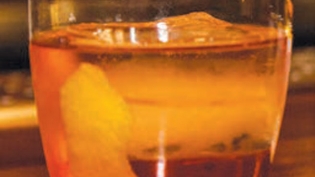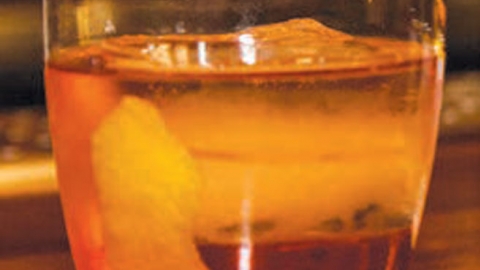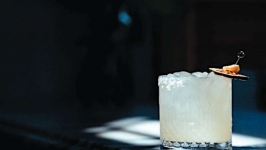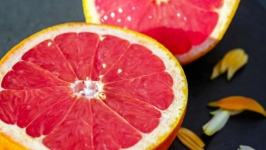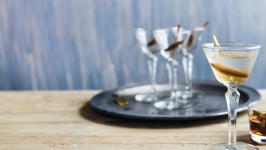Urban Moonshine: Bitters Make a Comeback in Cocktails
Any Vermonter with a woodstove knows that if you place a big rotting log on a fire, the result will be a lot of smoke and not much flame. The fire might even go out. That’s the analogy that Jovial King, herbalist and founder and owner of Urban Moonshine, uses to describe the average American’s digestion: a fire that’s burning low, stoked by a steady diet of white flour and refined sugar.
The result—the weak “fire”—is sluggish digestive and nervous systems. That problem can be turned around by eating the kinds of bitter foods humans once consumed in large quantities and that have since been stripped from our diets.
“Strong-tasting foods are the healthy, powerful foods,” says King, explaining that pungent greens from arugula to watercress contain antioxidants and phytonutrients that keep the body strong and healthy inside and out. But she’s not just talking about vegetables: Choosing brown rice over white, a shot of espresso over a creamy latte, and dark over milk chocolate are other easy ways to incorporate bitter foods in place of sweet, processed options.
“The American diet has been pared down and babied—and whitened,” says King, “and it needs to be challenged.” Likening adjusting one’s taste buds to ramping up an exercise routine, King calls bitters the “gym for your digestive system.”
Whereas European and Asian diets routinely include bitters through the consumption of aperitifs, green salads and herbs used in meal preparation, for example, in the United States a salad is more likely to mean watery iceberg lettuce than flavor-packed radicchio endive (“If you’re not tasting it, it’s not doing much,” says King.) At the same time, many Americans continue to cut out certain whole categories of foods in the interest of health—gluten and dairy have been two recent elimination trends. But King thinks that’s not necessary—or fun.
“If we baby ourselves too much, it’s not to our benefit,” she says. “Engaging and challenging the palate is a good way to make ourselves strong.”
Yet King recognizes that it can be difficult to fully overhaul one’s diet, and that’s where Urban Moonshine’s bitters come in. The bitters are certified organic and made from herbs that are sourced from small farms, many of them local, including Zack Woods Herb Farm in Hyde Park. They can be consumed before meals to stimulate digestion—“Bitters tell your body, ‘time to wake up!’” says King—or after eating to soothe a bloated, gassy belly.
They come in three flavors: original, citrus and maple. King calls the latter “bitters with training wheels” or “gateway bitters” because the flavor is a little less astringent than the others, which allows the palate to adapt. She also says the very act of squeezing a few drops of bitters onto the tongue can part of a ritual that results in more mindful eating. The long-term objective is to get people to feel better overall, and to develop a relationship with bitterness. That, in turn, will affect their food choices because the healthier foods will no longer seem so distasteful.
King knows whereof she speaks: As a teen, she suffered from a sensitive stomach, and turned to bitters at a time when Angostura was the best-known brand. They helped with her discomfort and, she says, strengthened her digestive system. As a young adult, King studied with a number of herbalists; all of them stressed that the root of good health is great digestion, a lesson she says she took to heart in starting her company. In fact, the ultimate goal is for people to need less of Urban Moonshine’s product.
“Once you start using bitters, you may not need them as much,” says Guido Masé, Urban Moonshine’s reference herbalist, “and eventually they can be dietary adjuncts.” A significant benefit of the liquid bitters is that whole foods that are palatable tend to be milder in terms of their chemistry, while those that are more beneficial might be too strong-tasting for regular consumption. Noting a “thick gray line between food and medicine,” Masé gives the example of yellow dock root, which, with its exceptionally bitter flavor, isn’t something most people would want to eat. But because it has significant liver detoxifying benefits, among others, it is commonly used as a medicinal, and is an ingredient in all of Urban Moonshine’s bitters.
In smaller doses, bitters are also helpful for children who don’t eat enough greens or other vegetables, helping to ease upset stomachs, constipation, and related discomforts. King’s own sons, who are 7 and 9 years old, keep spray bottles of Urban Moonshine bitters in their lunch boxes and use them daily.
King and Masé routinely travel to co-ops and Whole Foods stores that carry Urban Moonshine bitters to train staff in their use and benefits. The Urban Moonshine model, says Masé, is different from many other companies’ because it involves whole plant extraction, whereas others try to find the bitter molecule in isolation—an approach, he says, that “misses the boat.”
Bitters have another side, a history of lending cocktails a distinctive flavor. Since the early 19th century, any drink that was called a cocktail was made with bitters, a fashion that lasted until the late 1950s, when, says King, the taste for bitters faded. But cocktails such as the Manhattan, the Old-Fashioned and the Metropolitan have made a comeback, leading to a demand for high-quality bitters.
In response, Urban Moonshine has just launched its own line of cocktail bitters under the Plant Spirit brand. They’re available at liquor stores, bars, restaurants, online and at Whole Foods and other food and specialty stores around the Northeast; they’ll soon be widely distributed nationwide.
Two Burlington-area restaurants that have embraced them are Bluebird Tavern and Hotel Vermont’s Juniper and Hen of the Wood. Jim Hsieh, general manager at Bluebird Tavern, where the 802 Old-Fashioned (see sidebar) and other drinks incorporate Urban Moonshine bitters, praises them as “a refreshing alternative to the more commonplace brands.” Nick Roy, head bartender at Hotel Vermont, says the bitters “not only enhance the aromatics of cocktails, but have a soothing herbal flavor that brings a new style to making drinks.”
The line is a natural evolution for Urban Moonshine. In her early efforts to sell her bitters at farmers’ markets, King hoped to educate people about the digestive benefits of her products, but potential buyers just wanted to know whether they could use them in their cocktails, or they’d report once having been offered bitters on a lime to combat seasickness or mixed with soda after they’d had too many drinks. King doesn’t mind; she figures that any way to add bitters to people’s diets is positive.
“It’s a way to sneak high-quality medicinals into people’s homes,” she says of the cocktail line, noting that the World Health Organization determined that some 80% of the world’s population relies on herbs for medical care, a figure that has historically largely excluded the United States.
Now in its fourth year, and with 12 staff members on board, Urban Moonshine is focused on growing its educational offerings. Masé, who founded the Vermont Center for Integrative Herbalism in 2007, will be teaching an online introductory herbal course through the Urban Moonshine School; the biennial Urban Moonshine Herbal Conference is slated for May 24 at Shelburne Farms. That event is currently in the planning stages but will include a lineup of herbal classes and culminate in a farm-to-table cocktail pairing dinner. Urban Moonshine also sponsors Vermont Farm Tours’ Cocktail Walks, which take participants to three downtown restaurants to enjoy cocktails made with local spirits and bitters.
With a line of tonics that promises to enhance the immune system, emotional health, energy levels and sexual health, as well as single extracts and tinctures of a variety of herbs, Urban Moonshine’s products mean good health may be just a few drops away.
802 Old-Fashioned
Old Vermont



